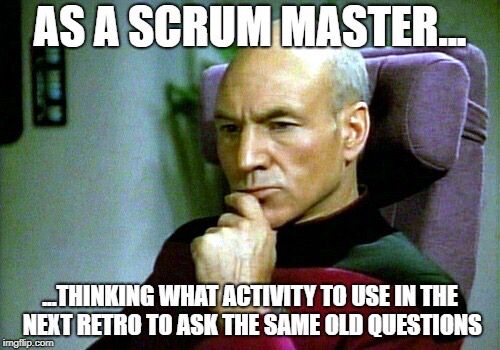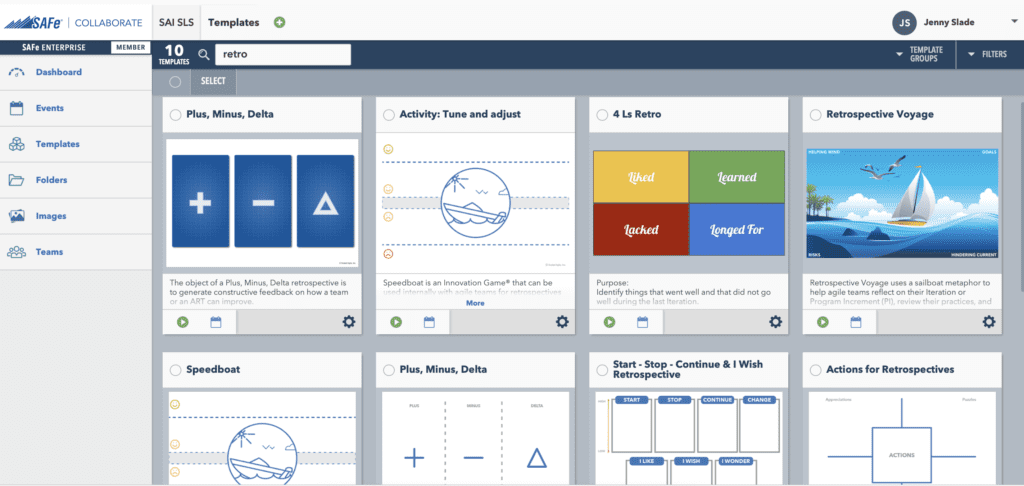Let’s talk about retrospectives. Inviting feedback on your team’s performance is a critical part of building a continuous learning culture. Retros can quickly tell you whether your team is still storming and norming (per Tuckman’s stages of group development) or humming with psychological safety.
But we’ve heard stories about retrospectives devolving into blame-a-thons where people just point fingers. Or there are the retros with crickets, because no one wants to speak up. And if you do them after every iteration, retrospectives can easily start to feel stale.

For scrum masters, the ultimate servant leaders, retros can be particularly challenging. You’ve got to keep your team engaged and try to make sure every team member’s voice is heard. You have to get your team to share feedback that’s thoughtful and constructive, rather than critical of individuals or other teams. And you have to facilitate this one-hour event—in all its tense, emotional, or boring glory—into tactical improvement items. No big deal.
Whether your team is phoning it in during retrospectives or you’re just looking for ways to improve yours, here are Leadership agility ideas to try.
1. Start with appreciations.
This retrospective advice comes to us from Lloyd Chaka of Emerson Solutions. Before adding your retro items to the team board, begin with shout-outs to fellow team members. Research shows that giving and receiving recognition can have a huge impact on people’s engagement and productivity. And productivity can improve the entire organization’s performance. Plus, appreciations just feel nice.
2. Play music.
Here’s a tip we learned from Sina Bleckwedel, now an RTE at NXP Semiconductor: Ask your team members what their favorite songs are. Then, start your next retrospective by playing one of those songs. Sina found that playing her team’s preferred music in the background while they were adding items to their retro board helped create a relaxing, fun, and familiar mood.
Hear more tips from Sina, Lloyd, and other scrum masters and RTEs in “Common Daily Challenges of a SAFe Professional” at the SAFe Community Forum.
3. Try out the retrospective templates in SAFe® Collaborate.
If your team’s getting sick of traditional stickies-on-a-board, we’ve got some plug-and-play templates to help you reframe your retros. Here’s one: imagine your team as a sailboat. In the last sprint, what felt like an anchor, and what puts wind in your sails? Log into the SAFe Community Platform, open SAFe Collaborate under the Implement tab and then search for “retro” to see all the templates.

4. Integrate an icebreaker.
Okay, so your team trades memes on Slack or stares at each other’s faces in video chats. That doesn’t mean you really *know* each other. Icebreakers can be a great way to encourage openness and build trust, which is what you need to create retros that are actually helpful. Here are some icebreakers recommended by SAFe scrum masters in the SAFe Community Platform’s Scrum Master Forum, and here’s a huge, crowd-sourced list of even more icebreakers.
5. Pull your retrospective into your daily stand-up.
Turn your stand-up into a quick retro with this great technique suggested by one of our members in the Scrum Master Forum, who learned it from the Chelsea football team. To encourage reflection, accountability, and improvement, ask these four questions during your stand-up. (If you do them near the beginning of the day, ask the questions about yesterday; if you do stand-ups near the end of the day, ask the questions about today):
- What did I want to happen yesterday?
- What actually happened?
- What caused the gap between my plans and reality?
- What am I going to do differently, or how could the team help?
Want to keep improving your scrum master skills?
As a SAFe Certified scrum master you’ve got access to some great new resources, just for you.
If you’ve set your SAFe Community profile to include your role as scrum master, when you log in you’ll now see a dedicated scrum master home page. This page can help you find the scrum master resources you need, faster.
We’ve also developed new guides designed to help you improve your day-to-day facilitation of SAFe events. These facilitation guides reflect input from professional enterprise scrum masters that we think you’ll find extremely useful! Visit the Implement > SAFe Art & Team Events > Team Events page to find guides for running daily stand-ups, iteration planning, iteration reviews and demos, backlog refinement, and of course, iteration retrospectives.
Have fun, do great work, and please share your feedback with us!
About Madi Fisher

Madi is the scrum master for the Information Technology and SAFe® Collaborate teams at Scaled Agile. She believes in the power of people and what they can accomplish as a team. And she loves being the glue that helps teams stick to a common goal—all while having fun. Madi’s secret sauce mixes the spirit of collaboration, a shared vision, and being customer-centric. Connect with Madi on LinkedIn.
Share:
Back to: All Blog Posts
Next: Planning to 100% Capacity? Don’t Do It!